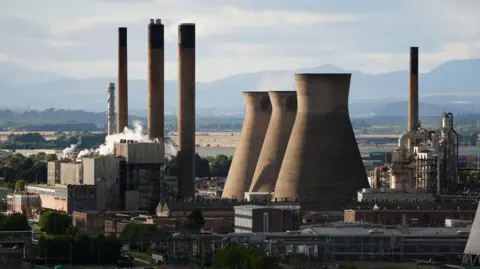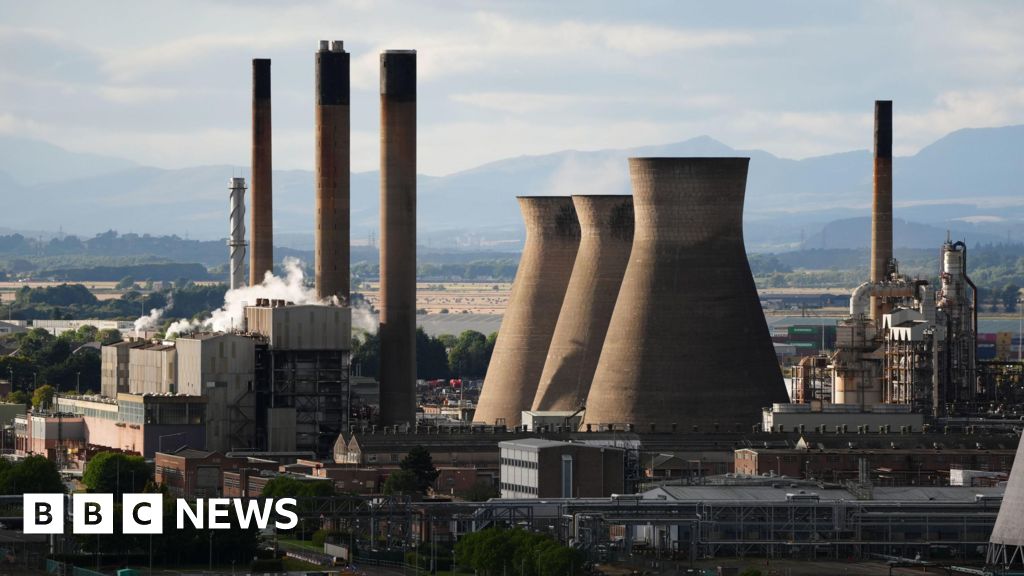 PA Media
PA MediaFirst Minister John Swinney has denied there has been a lack of action by the Scottish government over the closure of the Grangemouth oil refinery.
Petroineos confirmed on Thursday that the 100-year-old refinery would close – with the loss of 400 jobs – after announcing its intentions in November.
The BBC put to Swinney that there had been ten months to prepare, but he said the decision had come far too early and there were “a number of interventions in place”.
Workers have said the announcement was a “kick in the teeth” while unions labelled it a “terrible indictment” of both governments and of the company.
Union leaders had hoped the facility could remain open longer to provide time for a green alternative to be established at the site.
A three-point plan has been announced by the Scottish and UK governments, with Scottish Secretary Ian Murray insisting Grangemouth has a “bright future” as a renewables site.
The first minister met unions and local politicians at the nearby Forth Valley College to discuss how the Scottish government would provide support.
Challenged on why there was no clear plan for the site and workforce, Swinney pointed to the feasibility study Project Willow.
This study is looking at options to build a new long-term industry at the site supported by £100m in funding.
But a source close to Petroineos previously said that even if such plans were viable, they would not come in time to save the jobs that are expected to be lost.
The Unite union has said it does not expect to see results from this project for another five to 10 years.
Swinney also said there was “urgency” for the UK government to authorise the Acorn carbon capture and storage project.
This would see harmful greenhouse gas emissions piped under the North Sea from a base in St Fergus, Aberdeenshire.
He added: “The just transition has got to make sure that people have new opportunities as a consequence of moving on from industries that have been dependent on fossil fuels. That’s what we’ve got to deliver.
“I think the closure of the refinery is premature, we’ve made that point to Petroineos.
“I think this refinery could have continued for some time in the future to enable us to have more time to deliver those other opportunities.”
 PA Media
PA MediaIan Murray told the BBC the closure planned for 2025 was a “devastating blow for the workforce and the local community”.
He said the UK government had done everything it could, but that “the company didn’t countenance having a discussion” about keeping the refinery open.
He said the site had been losing money for 10 years, and that “there was no government support that would have kept it open”.
Murray said it was up to the government to “prove to the workforce that there are jobs of the future” available in Scotland, but that it would take time to deliver a just transition.
‘Failure to plan properly’
Petroineos said the closure was due to it being unable to compete with sites in Asia, Africa and the Middle East.
The BBC understands the refinery – the oldest in the UK – is currently losing around $500,000 (£383,000) a day and is on course to lose around $200m (£153m) in 2024.
The company said the decision would “safeguard fuel supply for Scotland” by converting the site into a terminal able to import petrol, diesel, aviation fuel and kerosene into Scotland – but would require a workforce of fewer than 100 employees compared to the current 475.
Derek Thomson of Unite said both governments had known for two years that there would be a move away from refining.
Petroineos’ decision, he said, was made with “little or no support” from government.
He said: “The failure of government to plan properly for a just transition will leave thousands of people out of work at Grangemouth but also thousands in the future if we don’t get it right.”
The refinery was opened by BP in 1924.
It expanded into petrochemicals in the 1950s and serves as the primary supplier of aviation fuel for Scotland’s main airports, while being a major supplier of petrol and diesel ground fuels across the Central Belt.
It accounts for about 14% of the UK’s overall refining capacity and supplies almost two-thirds (65%) of demand for refined oil products in Scotland.
Ineos acquired the site in 2005 and are responsible for the entire plant, while the the refinery itself is owned by Petroineos – a joint venture between Ineos and PetroChina.


